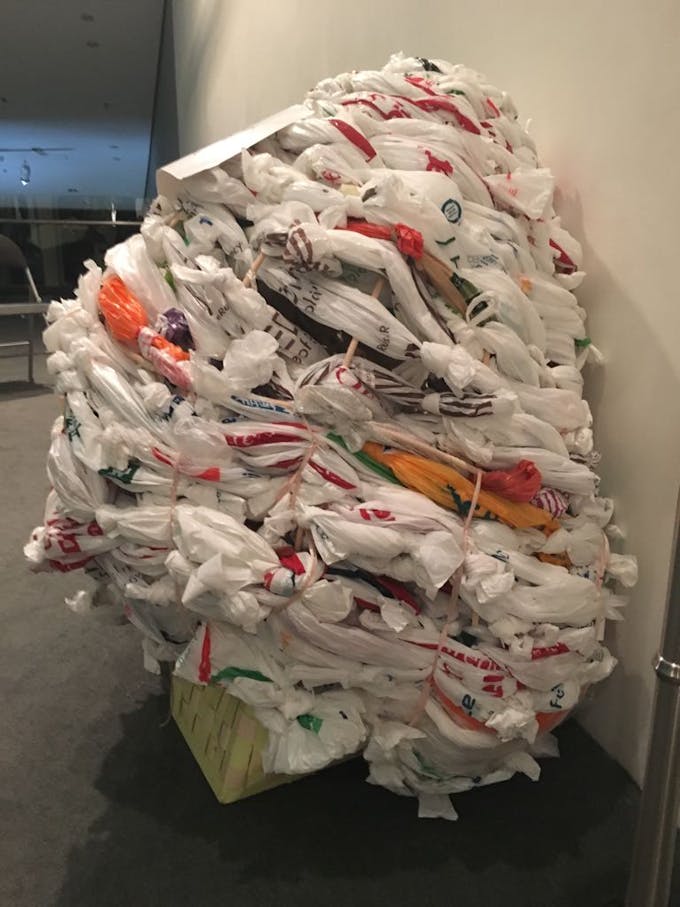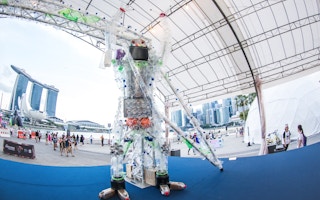World Wide Fund for Nature’s (WWF) global environmental movement Earth Hour is focusing on plastics in Singapore this year, soon after the government released a report highlighting the need for the city-state to rein in its massive plastic footprint.
To continue reading, subscribe to Eco‑Business.
There's something for everyone. We offer a range of subscription plans.
- Access our stories and receive our Insights Weekly newsletter with the free EB Member plan.
- Unlock unlimited access to our content and archive with EB Circle.
- Publish your content with EB Premium.
Earth Hour will run for 10 days this year, through to 25 March, with events ranging from light art installations and an eco products fare to a giant monster made from disposable plastic to raise awareness of the impact of plastic pollution on marine life and biodiversity.
Visitors are encouraged to bring their own containers to the plastic-free event, as participating vendors will not be using single-use plastic.
Earth Hour 2018 will use the social media hashtag #uselessplastic, taking aim at plastic products that are easily substitutable or unnecessary, such as straws, small bags and stirrers.
“
A mindset overhaul on plastics is due in Singapore. Plastics can be a resource, but a staggering amount is used and produced today. Having individuals understand the issue and more importantly, take action to reduce their plastic use is key to a lasting solution.
Elaine Tan, chief executive officer, WWF-Singapore
The event will culminate in the trademark action of Earth Hour—a symbolic powering down of lights in commercial, residential and government buildings for an hour—which will take place at 8.30pm local time in more than 7,000 cities around the world.
Elaine Tan, chief executive officer of WWF-Singapore, said: “A mindset overhaul on plastics is due in Singapore. Plastics can be a resource, but a staggering amount is used and produced today. Having individuals understand the issue and more importantly, take action to reduce their plastic use is key to a lasting solution. Earth Hour aims to drive this change right here in Singapore.”
Singapore’s plastic predicament
Earth Hour is to run a fortnight after Singapore’s National Environment Agency released a life-cycle assessment study on plastic bags and packaging that concluded that more needed to be done to curb plastic waste in the country.
The study revealed that in 2017, packaging waste constituted a third of the 1.67 million tonnes of domestic waste disposed of in Singapore. This includes single-use disposables such as plastic bags and food packaging.

A visual representation of how much plastic a Singaporean uses annually. Image: Eco-Business
In a separate study of Singapore’s domestic waste the previous year, 822,200 tonnes of plastic waste was generated. Just 7 per cent of it was recycled.
Singaporeans use an average of 13 plastic bags a day, amounting to 27 billion plastic bags used annually. Some of that use can be explained by the high proportion of citizens living in high-rise apartments who use plastic bags to hygienically dispose of their wet waste down rubbish chutes.
Since Singapore disposes of most of its waste plastic in waste-to-energy incineration plants, and needs plastic to fuel the incinerators, there has been less incentive to promote the reuse and recycling of plastic products, it was pointed out at a recent roundtable on plastic pollution held by Eco-Business and WWF in Singapore.
The Singapore government and retail sector has long resisted calls from non-governmental organisations (NGO) to introduce a ban or levy on plastic bags. Both measures have proved effective at reducing plastic pollution in many other countries, including in Japan, China, Taiwan, Hong Kong, India, Malaysia, Bangladesh, and the Philippines.
Citizens also see the need to curb the excessive usage of plastic. A public survey conducted by WWF around the Earth Hour event revealed strong support for measures to reduce plastic waste; 74 per cent of those surveyed were in favour of a plastic tax or ban.
In its report, NEA stated that the promotion of the use of alteratives to regular plastic disposables, such as oxo-biodegradable plastic, paper or bio-based plastic, “may not be better for the environment”, as it will ultimately be incinerated.
While incineration might seem to help Singapore achieve its ‘Zero Waste’ nation goal, it is not sustainable. The incineration of plastic produces dioxins, a toxic substance. Carbon dioxide, a greenhouse gas, is also emitted in the process.
After the plastic is burnt, the ashes are disposed of in Pulau Semakau, Singapore’s only landfill. It may reach capacity as early as 2035, a decade earlier than projected.
The government agency is advocating for a reduction in all types of disposables, and pushing for the use of reusable bags, plates and containers, which were examined to test their endurance in the study.
A single reusable bag could replace the use of 125 single-use plastic/degradable bags, or 52 single-use paper bags, in the span of a year, the study found.
The Earth Hour #uselessplastic campaign, and the government’s push to reduce the use of disposables, comes seven months after NGO Zero Waste SG launched the Bring Your Own campaign, to incentivise Singaporeans to bring their own cups, bottles, bags and containers, and so cut down on plastic use.










